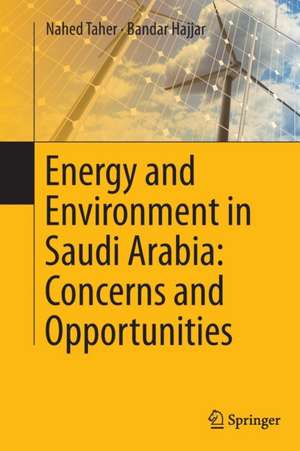Energy and Environment in Saudi Arabia: Concerns & Opportunities
Autor Nahed Taher, Bandar Hajjaren Limba Engleză Paperback – 27 aug 2016
| Toate formatele și edițiile | Preț | Express |
|---|---|---|
| Paperback (1) | 384.70 lei 6-8 săpt. | |
| Springer International Publishing – 27 aug 2016 | 384.70 lei 6-8 săpt. | |
| Hardback (1) | 391.99 lei 6-8 săpt. | |
| Springer International Publishing – 9 ian 2014 | 391.99 lei 6-8 săpt. |
Preț: 384.70 lei
Nou
Puncte Express: 577
Preț estimativ în valută:
73.62€ • 76.58$ • 60.78£
73.62€ • 76.58$ • 60.78£
Carte tipărită la comandă
Livrare economică 12-26 aprilie
Preluare comenzi: 021 569.72.76
Specificații
ISBN-13: 9783319351995
ISBN-10: 3319351990
Pagini: 234
Ilustrații: XXXI, 203 p. 76 illus.
Dimensiuni: 155 x 235 x 13 mm
Greutate: 0.34 kg
Ediția:Softcover reprint of the original 1st ed. 2014
Editura: Springer International Publishing
Colecția Springer
Locul publicării:Cham, Switzerland
ISBN-10: 3319351990
Pagini: 234
Ilustrații: XXXI, 203 p. 76 illus.
Dimensiuni: 155 x 235 x 13 mm
Greutate: 0.34 kg
Ediția:Softcover reprint of the original 1st ed. 2014
Editura: Springer International Publishing
Colecția Springer
Locul publicării:Cham, Switzerland
Cuprins
Environmental Challenges, Regulations and Institutions in Saudi Arabia.- Environmental Concerns and Policies in Saudi Arabia.- Environmental Investments.- Incentive Structures.- Environmental Business Channels.- The Way Forward.
Textul de pe ultima copertă
The vast oil resources in Saudi Arabia have for decades encouraged a generous system of oil subsidies, making the Kingdom one of the leading countries in the world with the cheapest domestic price of oil. Such subsidies have, however, encouraged inefficient utilization of oil, which is largely consumed in the power, water and transportation sectors, contributing substantially to CO2 emission in the country. These problems are exacerbated by demographic dynamics, urbanization, changes in income and consumption patterns, and industrialization. On current trends of domestic consumption patterns, Saudi Arabia will consume the whole of the oil it will produce by 2030, which will reflect negatively on the financial capacity of the government to execute its development programs. It is this revenue constraining concern, rather than ecological challenges, that has started to attract policy attention in Saudi Arabia. This book gives a unique perspective on these challenges by looking at them as investment opportunities, not financial constraints on the government budget. It sets out to examine the nature and extent of the energy and environmental challenges facing Saudi Arabia, and to explore various options for turning these challenges into profitable investment opportunities that could create jobs, boost income, develop capability in clean energy technology and promote environmental sustainability.
Caracteristici
Analyzes the key energy and environmental challenges confronting Saudi Arabia Investigates what incentive structures the Saudi government must put in place to attract private sector investments in clean energy technologies in the region Analyzes the opportunity cost of domestic oil consumption in Saudi Arabia, and how might this impact on the Kingdom’s future energy security and government revenue Includes supplementary material: sn.pub/extras














